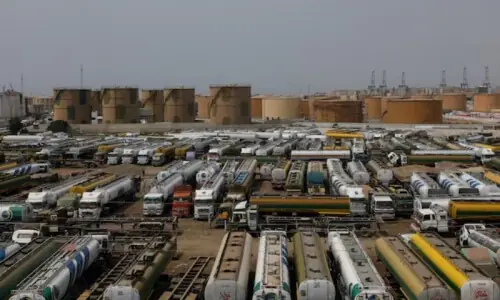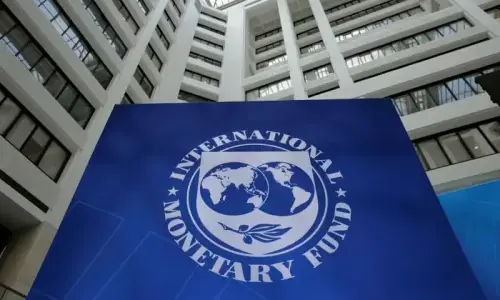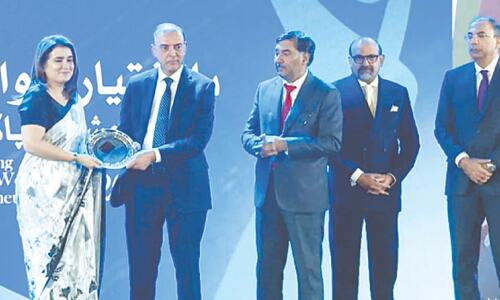The Pakistani stocks yielded a mouth-watering return of 38 per cent in the financial year ended June 30, 2021. That was the highest return provided to the investors after 14 years — 2013-14 had given a return of 41pc. But it has to be reckoned that over the past five years, the average yearly return dropped to 7pc as in the last three of the five years, the market performed extremely poorly: 2017-18 gave out a negative return of 10pc; 2018-19 a negative return of 19pc and 2019-20 yielded a nominal positive return of 1.53pc. With such a poor base, the 38pc return in 2020-21 is neither strange nor something to jump with joy.
Between July 1, 2020, and June 30, 2021, the KSE-100 Index skyrocketed by as many as 12,934 points and settled at 47,356 points on June 30 — the highest level in four years. The preceding years were replete with unsurmountable problems on the political and economic fronts. It all began with the misjudgement over the entry into the Emerging Market (EM) from Frontier Market (FM) in 2017. It was followed by Covid-19 rearing its ugly head that put the industrial and commercial activities in jeopardy. The CEO of Topline Securities, Mohammad Sohail, stated that 2021 had seen a surge of liquidity post the Covid waves, leveraged market reforms and economic recovery.
Analysts calculate that the foreigners may have reduced their exposure in Pakistan equities by $2.2 billion in the preceding six years
Foundation Securities said in a report that baring exploration and production (E&P) and tobacco, the strong performance was noted (by all sectors) across the board. Technology and cyclical sectors outperformed given fiscal and monetary stimulus for revival of economic growth. Major growth was seen in the technology sector by 162.5pc followed by engineering 138.5pc, cement 71.7pc and automobiles 51.8pc.
Among other sectors, textiles provided 44.6pc return, chemical 34.6pc, power 28.8pc, oil marketing companies 24.8pc, banks 22.3pc, fast-moving consumer goods (FMCG) 16.8pc and fertiliser 5.8pc. However, E&P and Tobacco were the worst hit sectors that yielded negative returns of -1.0pc and -15.7pc.
Among participants, foreign investors continued to dump stocks. Foreigners, mainly the fund managers reduced their portfolios by $395 million. Analysts calculate that the foreigners may have reduced their exposure in Pakistan equities by $2.2 billion in the preceding six years.
The two major worries that preyed on foreigners’ minds in 2020-21 was firstly the possibility of the Financial Action Task Force retaining Pakistan in the grey list, notwithstanding the country has met all but one of the points. Secondly, Morgan Stanley Capital International (MSCI) was also considering demoting MSCI Pakistan to FM from EM as none of the companies met the emerging market size and liquid criterion.
Among the local participants, individuals bought shares worth $332m followed by purchases of shares valued at $142m by companies. Banks and brokers reduced their exposure by $142m and $35m.
Topline Securities acknowledged the revival of investor sentiments in 2020-21. “During the year, value traded per day (ready and future) averaged at Rs28bn, which represented the highest value traded on a single day in the last 15 years,” Mr Sohail of Topline said.
As the market was flush with liquidity with investors returning in droves, the Initial Public Offering (IPO) market took off to a fresh start with seven ordinary shares entering the market to Rs20bn which was the highest that the corporates raised in 14 years, since 2006-07.
One preference shares issuance to investors mobilised Rs11bn. The ordinary shares offer included those of The Organic Meat Company, TPL Trakker Limited, Agha Steel Industries Limited, Panther Tyres Limited, Service Global Footwear Limited, Citi Pharma Limited and Pakistan Aluminium Beverages Can Limited.
The lone preference share issuance was by Engro Polymer and Chemicals Limited.
The key highlights of 2020-21 were identified by Arif Habib Limited as a significant cut in the benchmark policy rate by 625bps to 7pc at the start of the year and lower yields on fixed income instruments, both of which rendered equities as the preferred asset class during the year. Secondly, notable improvement was witnessed in macros, support from global lenders, the launch of the Roshan Digital Account, and robust remittances growth.
All of those aided the inflow of foreign exchange reserves. On the flip side, the global lockdowns and ensuing reduction in trade deficit further supported an appreciation in the rupee against the dollar in 202-21. In order to deal with the pandemic’s blow to the economy, the government and the State Bank of Pakistan provided stimulus to the construction sector in the form of amnesty which spurred a rally at the bourse mainly in the cyclical stocks (cement and steel).
Moreover, strong corporate profitability trends were also witnessed which aided the bullish spree. “Revival in economic growth, healthy offtake, stable pricing power and low borrowing rates translated into robust earnings jump in cement, steel and automobile sectors during nine months of 2021-21,” Tahir Abbas, Head of Research at Arif Habib Limited said.
Going forward, Raza Jafri, Head of Research at Intermarket Securities observed that Pakistan wants to remain in the International Monetary Fund Programme (IMF), but balancing a growth push with continued structural reforms is tricky. Areas such as an increase in petrol prices and unstable dollar/rupee parity might be taken as leading indicators for Pakistan’s willingness to continue reform, although the market may take until September to find a firm direction, once the IMF review takes place, Mr Jafri said and added that nonetheless, the ‘risk-reward’ was attractive. He reiterated the brokerage’s Dec 21 Index target of 54,500 points. The index is already at a 4-year high of 47,800 points.
In case the index hits 54,500, it would surpass the May 25, 2017, all-time high index level of 53,124. Excepts for a few cynics, most marketmen at the moment believe that nothing is beyond the realms of possibility.
Published in Dawn, The Business and Finance Weekly, July 5th, 2021


































